Overview
Coding can often present significant challenges for developers, such as time-consuming debugging and manual code assessments. However, integrating a linter into the programming process can effectively address these issues. Linters automate code reviews, enforce coding standards, and provide real-time feedback on errors. This allows developers to focus on crafting effective solutions rather than getting bogged down by repetitive tasks.
Furthermore, linters enhance productivity by streamlining the coding process. By catching errors early and enforcing best practices, they significantly reduce the time spent on debugging. Imagine being able to write code with the confidence that potential issues are flagged instantly—this is the power of a linter.
In addition, using a linter leads to improved code quality. When coding standards are consistently enforced, the overall maintainability and readability of the codebase increase. This not only benefits individual developers but also enhances collaboration within teams, as everyone adheres to the same guidelines.
Are you ready to elevate your coding practices? Explore the tools available on platforms that integrate linters, and experience firsthand how they can transform your development workflow. Embrace the efficiency and clarity that a linter brings to your coding experience.
Introduction
In the rapidly changing world of software development, developers often face significant challenges that can hinder productivity and code quality. How can these hurdles be effectively addressed? Enter Kodezi, a powerful tool designed to tackle these issues head-on. By automating error detection and enforcing coding standards, Kodezi not only streamlines workflows but also cultivates a collaborative atmosphere among team members.
The benefits of using Kodezi are clear:
- Reduced bugs
- Enhanced security
- A culture of continuous learning
Imagine a scenario where developers can focus more on creativity and problem-solving rather than getting bogged down by routine coding errors. With Kodezi leading the charge, teams are empowered to deliver higher-quality software at an accelerated pace.
This article explores the multifaceted advantages of linters, particularly Kodezi, in modern development practices. We will delve into how these tools can transform coding from a tedious task into a streamlined and efficient process. Ready to enhance your coding experience? Let's explore the tools available on the Kodezi platform.
Kodezi | Professional OpenAPI Specification Generator - AI Dev-Tool: Boost Programming Productivity with Linting
In today's fast-paced development landscape, coding challenges can often hinder productivity. Kodezi emerges as a powerful AI-driven tool that automates the generation of OpenAPI specifications, addressing these hurdles effectively. By integrating a linter in programming, Kodezi empowers developers to effortlessly maintain high coding standards.
Have you ever found yourself bogged down by manual code reviews? The CLI independently detects and corrects mistakes in real-time, allowing you to concentrate on building robust applications without the burden of constant oversight. This synergy with the linter in programming streamlines your development workflow, showcasing how modern environments can leverage automation to enhance efficiency and elevate code quality.
With features designed to tackle performance bottlenecks, bolster security, and ensure compliance with development standards, Kodezi CLI stands out as a versatile solution for teams looking to auto-heal codebases and significantly boost programming productivity. Regular audits of software quality, facilitated by a linter in programming, serve as benchmarks for assessing improvements. This further underscores the value of these tools in a developer's toolkit; as Medi Madelen Gwosdz aptly noted,
- "A linter in programming isn't an either/or proposition; it functions as a valuable advisory resource much like a spelling or grammar checker in word processors."
Furthermore, the case study titled "Making Progress Visible" emphasizes the necessity for transparency in utilizing AI tools, demonstrating how sharing success stories can inspire teams to adopt this innovative approach. In addition, Kodezi prioritizes privacy, ensuring that your work and data are safeguarded, making it a secure choice for those aiming to enhance their coding practices.
Ready to get started quickly? The platform offers a "5 minute quickstart" guide and invites you to "See a demo" to experience its capabilities firsthand. Kodezi CLI is compatible with various programming languages, making it an adaptable solution for diverse development environments. Explore the tools available on the Kodezi platform and transform your coding experience today!
Ensure Code Quality: How Linters Help Maintain Standards
A linter in programming is an essential tool for addressing the common challenges developers face in maintaining code quality. They enforce coding standards and stylistic conventions across the programming base with a linter in programming that automatically identifies errors such as syntax mistakes and formatting inconsistencies. This ensures that all developers adhere to the same guidelines, improving readability and fostering smoother collaboration among team members.
Have you ever experienced the frustration of debugging due to inconsistent coding practices? Research shows that teams utilizing code analysis tools can see a significant reduction in bugs, with studies indicating a decrease of up to 40% in production errors. This proactive approach not only saves time and resources but also allows developers to concentrate on building robust solutions; furthermore, the advantages of using a linter in programming are amplified when paired with tools that offer automated debugging and performance enhancement.
Kodezi's AI-driven solutions enable teams to quickly resolve issues, enhance security compliance, and improve overall code quality. As Aristotle wisely noted, 'Quality is not an act, it is a habit,' underscoring the importance of maintaining high programming standards. In 2025, the role of the linter in programming is more critical than ever in nurturing a culture of quality, contributing significantly to successful software development.
Additionally, platforms designed to enhance efficiency for developers managing documents can leverage the linter in programming to streamline their coding workflows, ensuring that quality remains a priority. User testimonials from over 1,000,000 programmers illustrate how Kodezi has revolutionized debugging and boosted productivity, making it an invaluable asset in today’s development landscape.
Are you ready to elevate your coding practices? Explore the tools available on Kodezi's platform and experience the transformation for yourself.
Enhance Efficiency: Streamline Development Processes with Linters
In the fast-paced world of software development, coding challenges can significantly hinder efficiency. Incorporating a linter in programming as a tool for static analysis into the development process addresses these challenges by providing immediate feedback on quality. Developers receive alerts about potential issues, enabling them to tackle problems as they arise rather than during later stages of development. This proactive approach fosters a culture of continuous improvement. As Joao Carlos da Silva, a software engineer at market4u, notes, "Embora seja uma prática valiosa adotar um Linter, é importante entender que nem todas as regras devem ser seguidas rigidamente." This balance between adhering to standards and practical implementation is essential for maximizing efficiency benefits from code analyzers and the use of a linter in programming.
Furthermore, tools can be set up to operate automatically during the build process, ensuring consistent application of quality checks without requiring manual intervention. The AI-powered automated debugging tool enhances this process by quickly detecting and correcting programming issues, offering comprehensive insights into what went wrong and how to fix it. A case study on incorporating static analysis tools into CI/CD processes demonstrates that this approach aids in detecting and addressing programming issues prior to reaching production, ultimately improving overall software quality.
In addition, integrating a linter in programming with other quality assurance tools, such as Kodezi CLI, can further enhance their effectiveness, creating a robust framework for maintaining high programming standards. As we consider the efficiency of development processes, it is crucial to remember that if we wish to count lines of text, we should not regard them as 'lines produced' but as 'lines spent.' This emphasizes the importance of quality over quantity in programming. Are you ready to explore the tools available on the Kodezi platform to elevate your coding practices?
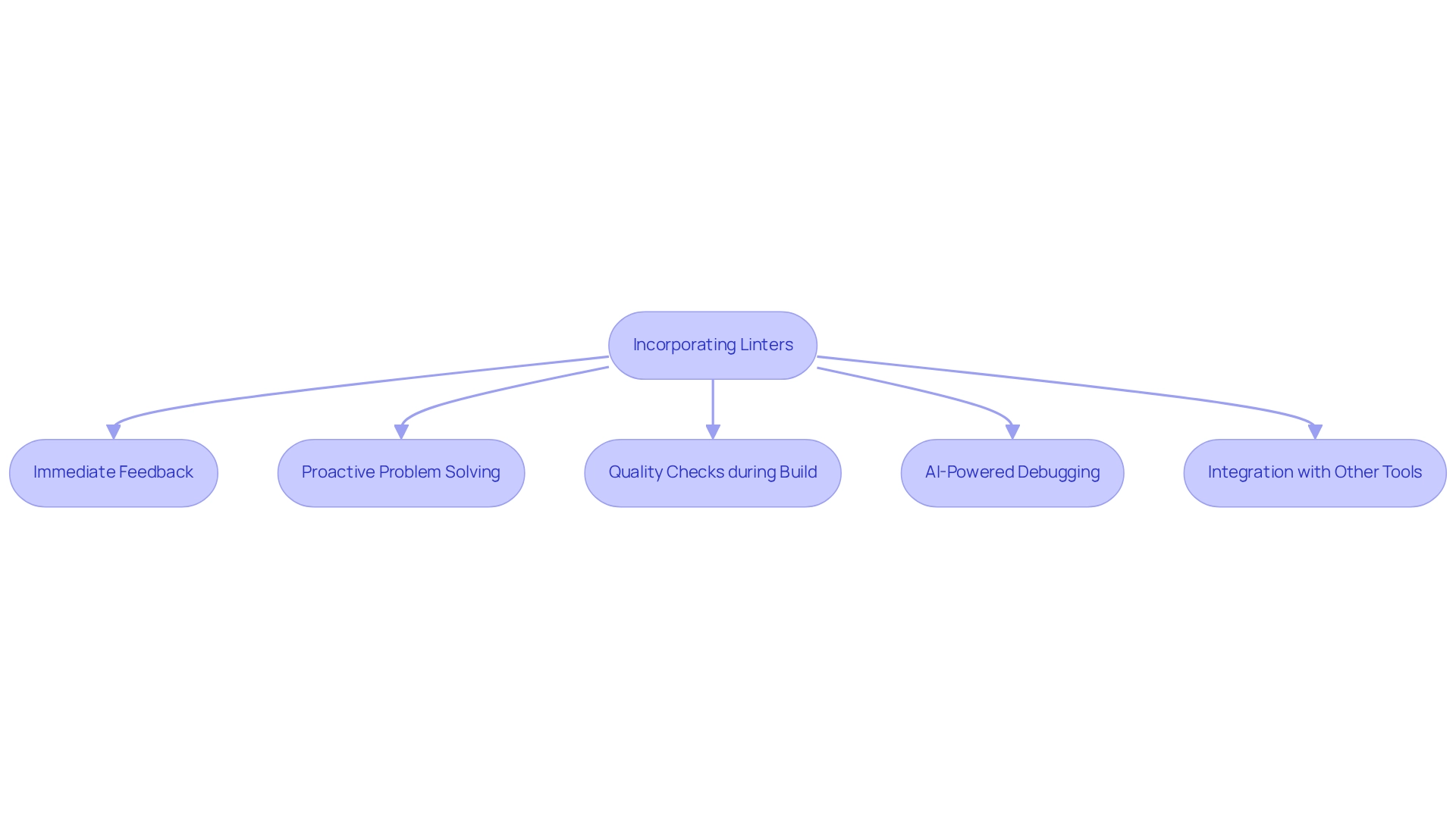
Identify Security Issues: Protect Your Code with Linters
Developers often face significant coding challenges, particularly when it comes to ensuring security within their codebases. A linter in programming serves as an essential tool for detecting security issues, effectively flagging potentially hazardous constructs such as deprecated functions and insecure libraries that can lead to vulnerabilities. By incorporating security checks into the linting process, developers can proactively mitigate these risks before they escalate into significant problems.
Furthermore, this approach not only strengthens the security posture of applications but also cultivates a culture of security awareness among developers, motivating them to write safer code from the outset. Notably, the age of an application correlates with the presence of vulnerabilities, making the use of a linter in programming essential for proactive security measures throughout the application lifecycle. In fact, a significant percentage of developers now incorporate security checks into their linter in programming processes, reflecting a growing acknowledgment of the importance of secure programming standards in 2025.
In addition, Kodezi's automated debugging features further improve this process by enabling developers to instantly identify and rectify issues in the codebase. This capability offers detailed explanations and insights into what went wrong and how it was resolved, assisting in quick problem-solving while guaranteeing that programming follows the latest security best practices and coding standards.
Case studies have shown that code analyzers can successfully identify security issues. For instance, the case study titled 'The Shared Responsibility of Cybersecurity' emphasizes that cybersecurity is a collective responsibility, enhancing collaboration and strengthening the organization's overall security framework. As the global IT security market is expected to attain $366.1 billion by 2028, the function of code analysis tools in ensuring secure programming is more essential than ever.
As Nivedita James Palatty, a Technical Writer, noted, 'Overall it was a good year for anyone interested in the ebb and flow of the cybersecurity landscape.' This underscores the importance of a linter in programming to navigate these challenges. Are you ready to enhance your coding practices? Explore the tools available on the Kodezi platform today!
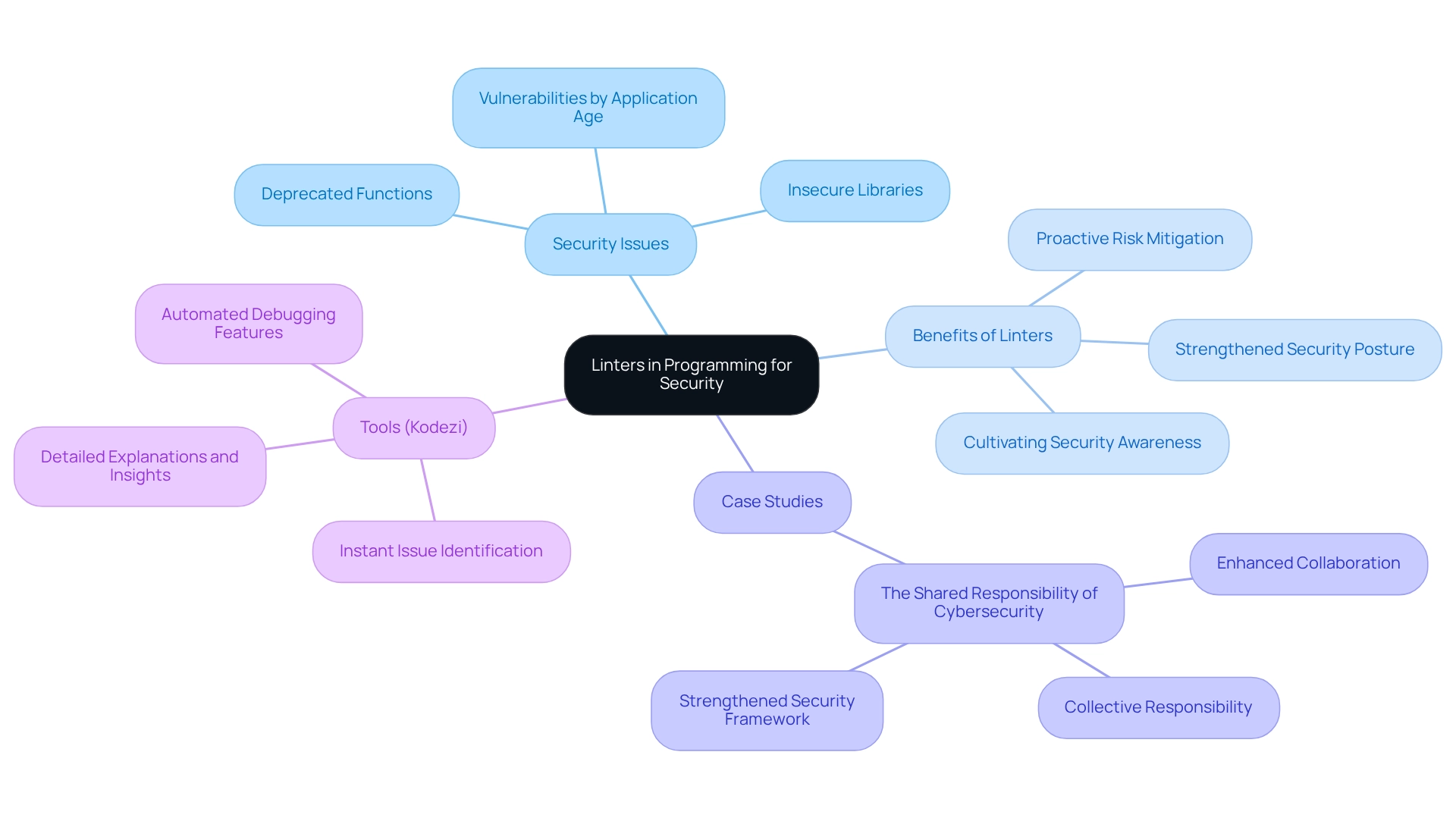
Integrate Seamlessly: Using Linters in Different Development Environments
Coding challenges can often hinder developers' efficiency and productivity. How can teams overcome these obstacles? A linter in programming can be effortlessly integrated into a variety of development environments, including integrated development environments (IDEs), text editors, and continuous integration/continuous deployment (CI/CD) pipelines. Tools like ESLint for JavaScript and Pylint for Python are especially popular, as they can be set up to run automatically, providing consistent feedback across various programming environments. This adaptability enables teams to uphold coding standards across diverse projects and programming languages, ensuring uniformity among developers.
By integrating code quality tools into their workflows, teams not only enhance collaboration but also significantly reduce friction during the development process. A case study highlighted that organizations using a linter in programming experienced a 50% reduction in bugs, underscoring the effectiveness of these tools in elevating software quality. Furthermore, based on the 2022 DORA survey, 80% of participants reported they were in the midst of the DevOps implementation process, demonstrating an increasing acknowledgment of the importance of code analysis tools in CI/CD pipelines.
In addition, GitLab's survey found that 1 out of 4 organizations practicing DevOps are in the computer hardware or software services industry, emphasizing the prevalence of these practices. Statistics show that a significant portion of teams are now employing tools within their CI/CD pipelines, highlighting their value in automated reviews and early error identification. This is where Kodezi comes into play. The CLI tool emerges as a versatile resource for B2B engineering teams, autonomously enhancing code quality and correcting bugs before they reach production.
Unlike conventional linters, this CLI provides a streamlined method that boosts productivity and minimizes manual oversight. For teams aiming to begin swiftly, the platform offers a '5 minute quickstart' guide and the choice to 'See a demo,' demonstrating how these tools can efficiently fit into current workflows. Instances of effective linter in programming integration in CI/CD pipelines further demonstrate how these tools, including Kodezi CLI, can streamline development processes and improve overall software quality. Are you ready to explore how Kodezi can transform your coding practices?
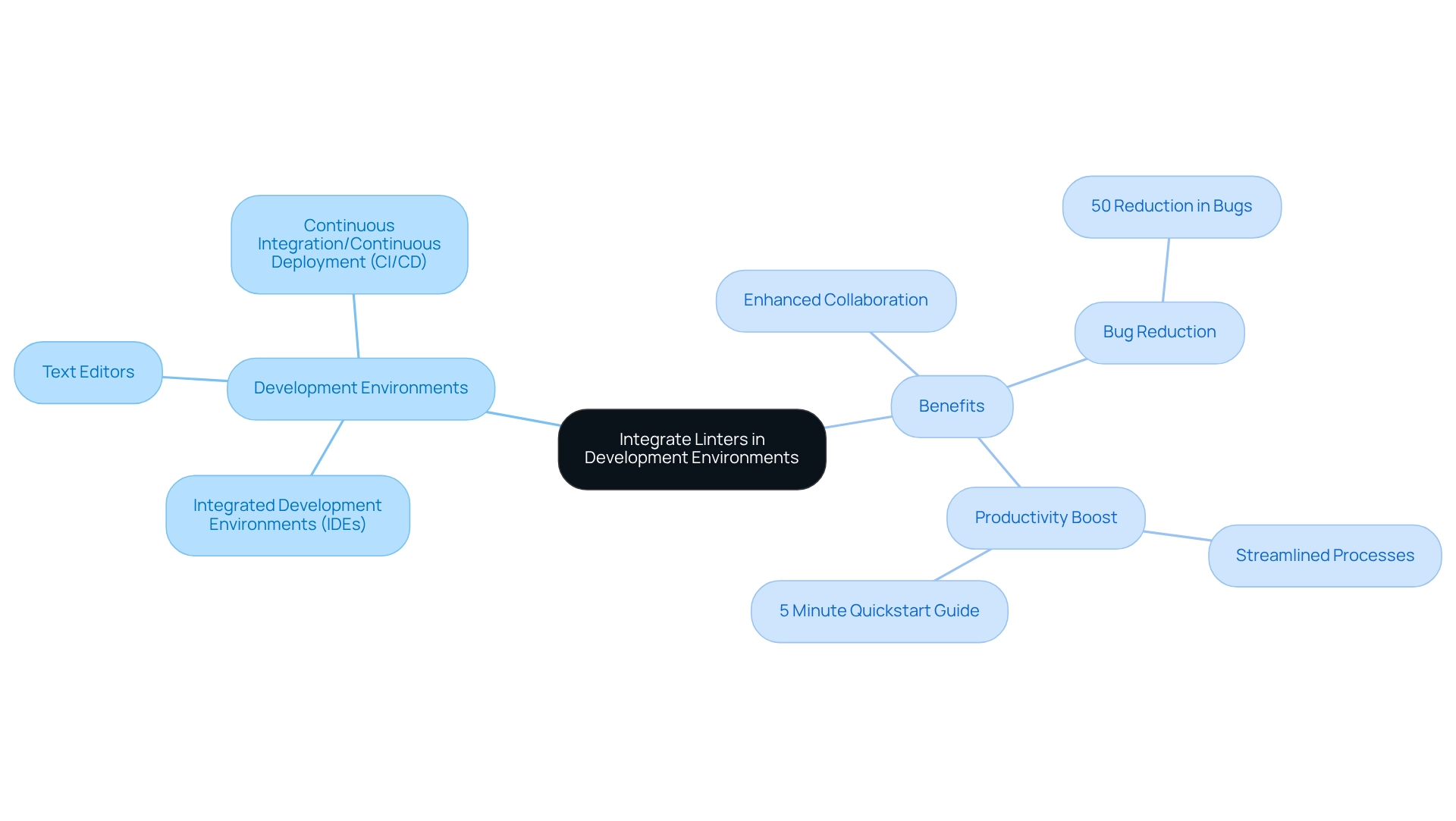
Learn and Improve: Educational Benefits of Using Linters
Developers often face significant challenges in maintaining quality standards in their coding practices. A linter in programming serves as an invaluable educational tool that not only addresses these challenges but also provides prompt feedback on programming techniques. This immediate feedback allows less experienced developers to grasp best practices and understand the importance of writing clean, maintainable code. Furthermore, this ongoing feedback cycle fosters a culture of advancement, inspiring developers to refine their skills and embrace better programming practices over time.
In this context, Kodezi stands out by breaking down the programming process into manageable tasks. As Mark Twain wisely noted, 'The secret of getting ahead is getting started. The secret of getting started is breaking your complex overwhelming tasks into small manageable tasks, and then start on the first one.' This philosophy aligns closely with the application of code analyzers, which decompose programming into feasible enhancements. As a result, teams become more skilled, with research indicating that around 70% of developers report enhanced programming abilities through regular use of a linter in programming for feedback.
The transformation achieved through Kodezi leads to the provision of high-quality software, as teams utilize insights from analyzers to improve their programming practices and overall performance. In addition, platforms like Kodezi enhance developer efficiency by offering automated tools for debugging and optimization. This simplification allows over 1,000,000 users to locate and resolve issues effectively.
Moreover, the platform's user-friendly features, such as code commenting and auto-heal abilities, further illustrate how these tools promote better programming practices and efficiency. In a humorous contrast, while computers may operate at lightning speed, true efficiency in programming lies in how developers utilize tools like linters in programming and Kodezi to enhance their skills and output. Why not explore the tools available on Kodezi and see how they can elevate your coding experience?
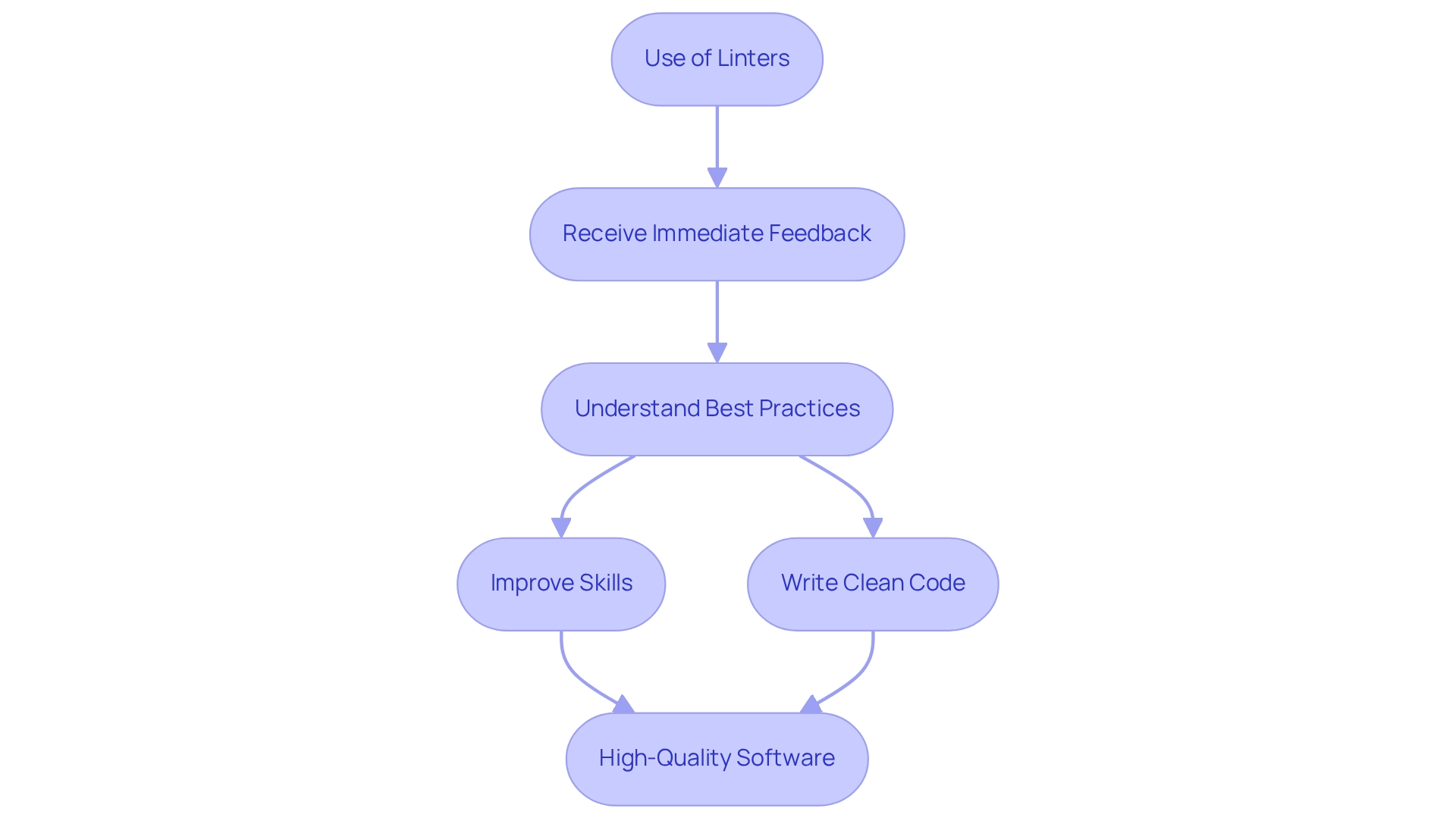
Foster Collaboration: How Linters Enhance Team Coding Practices
The linter in programming plays an essential role in addressing common challenges developers face by promoting cooperation among team members through consistent programming standards and practices. When all developers utilize the same linter, it minimizes conflicts related to code style and formatting. This allows teams to concentrate on functionality rather than engaging in debates over stylistic choices. Such uniformity not only elevates the overall quality of the codebase but also enhances communication within the team. By creating a common basis for programming practices, the integration of a linter in programming helps foster a more unified and efficient development environment.
In fact, consider this: 45% of surveyed employees feel overwhelmed by the number of meetings they attend. Efficient programming practices facilitated by linters can significantly reduce unnecessary discussions. Furthermore, teams that emphasize uniform programming standards frequently enjoy improved psychological safety. A case study on psychological safety in teams illustrates that fostering a supportive atmosphere results in better performance and innovation. This atmosphere encourages team members to share diverse ideas without fear of criticism over coding styles.
Moreover, tools such as CLI can further enhance this collaborative environment. The CLI autonomously enhances codebases and resolves issues before they reach production, streamlining the development process. Users have reported transformative experiences with the tool, allowing them to find and resolve bugs faster and more efficiently. As one user observed, "This tool is a lifesaver when it comes to correcting issues and bugs," highlighting how such resources can enhance the functionality of code analyzers by automating code quality improvements. Additionally, the platform's user-friendly attributes have enabled more than 1,000,000 developers, simplifying the process for teams to uphold high programming standards while concentrating on innovation.
As Katrin Kizilkan notes, gaining insights on training and challenges is vital for professionals to enhance their skills in a dynamic workplace. Ultimately, the adoption of code analysis tools, alongside resources like Kodezi, not only streamlines coding practices but also fosters an environment conducive to innovation and improved team dynamics. Why not explore the tools available on the platform to elevate your coding experience?
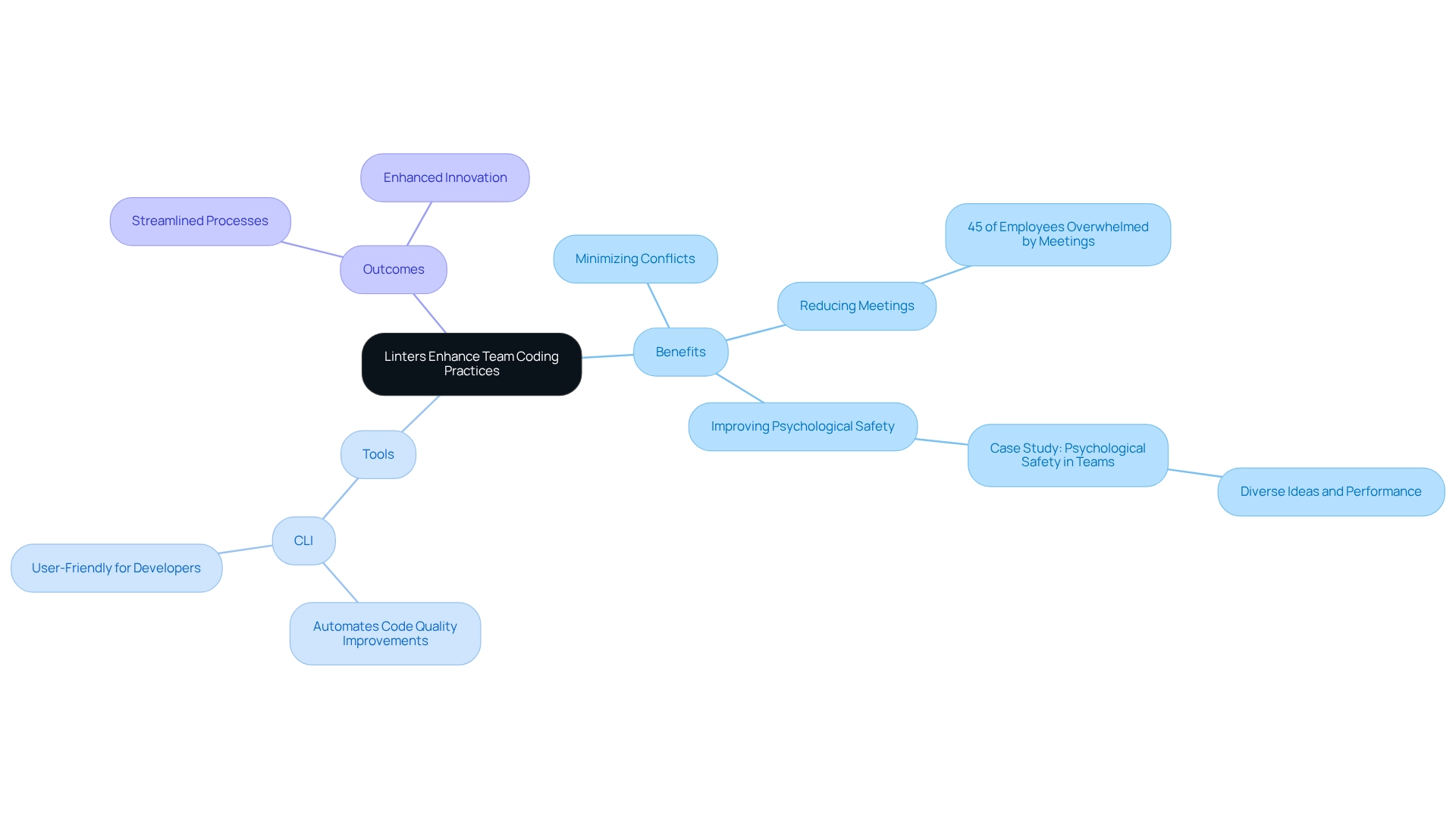
Automate Code Reviews: Save Time and Ensure Consistency with Linters
Developers often encounter significant challenges in maintaining code quality and adhering to established standards. A linter in programming plays a crucial role in automating the review process by delivering immediate feedback on quality. By seamlessly integrating a linter in programming into the development workflow, teams can identify issues early, preventing them from escalating to the review stage. This proactive method significantly decreases the time invested in manual assessments, enabling developers to focus on more complex elements of the review process, such as architectural choices and functionality improvements.
Imagine being able to produce higher-quality software more efficiently. Research shows that teams employing automated review tools can save up to 30% of their time during the evaluation process. This time savings allows them to concentrate on providing strong solutions. Furthermore, automated programming review tools, such as CLI, support various programming languages, making them ideal for diverse development teams. Kodezi CLI autonomously improves codebases, fixes bugs before they reach production, and addresses performance bottlenecks while ensuring adherence to the latest security best practices.
The combination of Prettier and ESLint allows teams to focus on substantive issues in code, further enhancing efficiency. The uniformity guaranteed by code analysis tools not only simplifies the coding process but also promotes a collaborative environment where developers can flourish. For teams looking to integrate a linter in programming into their workflow, starting with a gradual onboarding process and establishing clear standards can maximize the benefits. By adhering to best practices—setting clear standards, gradually onboarding AI, incorporating it into CI/CD pipelines, and merging automation with human expertise—teams can fully utilize AI-driven tools like the CLI to enhance software development efficiency. To get started, consider implementing a pilot project that utilizes Kodezi CLI to demonstrate its impact on your team's productivity. How much more could your team achieve with the right tools?
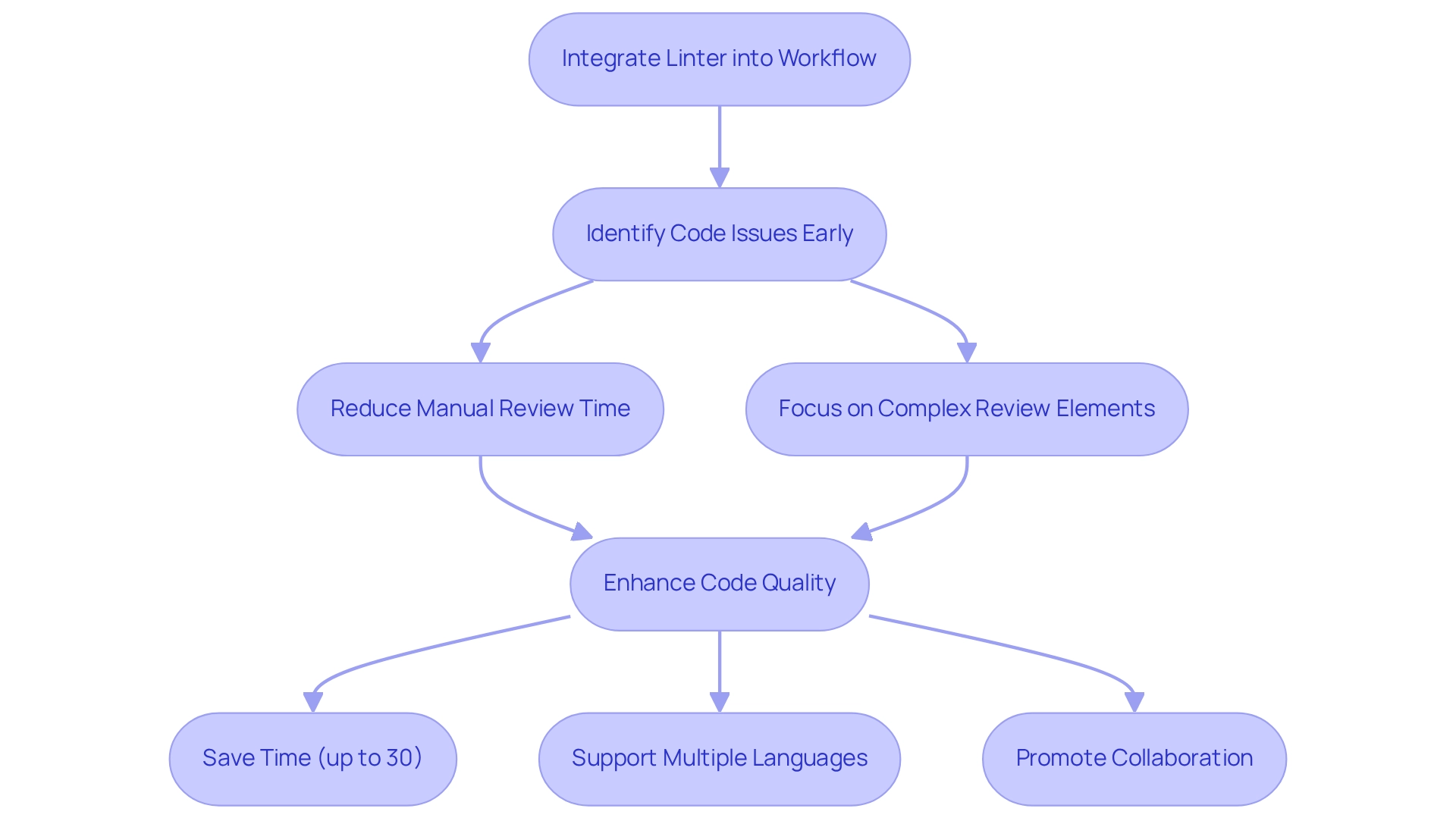
Adapt to Any Language: The Versatility of Linters in Programming
Coding challenges can be daunting for developers, especially in multi-language environments. Linters in programming emerge as indispensable tools that adapt seamlessly to various languages, including JavaScript, Python, and Java. Each tool is specifically designed to tackle the unique syntax and conventions of these languages, empowering teams to uphold high programming standards across diverse projects. This ensures that all developers benefit from using a linter in programming, regardless of the programming language they are using.
Furthermore, the increasing acknowledgment of code analyzers as vital elements in contemporary software development is evident, with around 0.25% of developers employing tools such as Rubber Duck.AI. As George Guimarães, Co-founder and CEO of SourceLevel, states, "Linters help you get more productive and save you time and money. They drive your team to better decisions (those oriented by data) and share ownership over the quality."
In addition, case studies like Konsist's involvement in restructuring multi-module Kotlin projects illustrate how enforcing uniform programming standards via tools leads to cleaner, more maintainable code. This ultimately enhances overall productivity. Similarly, the accessible experiences highlighted by platforms featuring similar tools demonstrate how a linter in programming facilitates a more seamless development process, rendering them essential for developers pursuing efficiency.
With Kodezi CLI, teams can auto-heal codebases in seconds, significantly boosting programming productivity and ensuring that development standards are met effortlessly. Are you ready to explore the tools available on the Kodezi platform and elevate your coding practices?
Maximize Productivity: The Overall Impact of Linters on Development
Developers often encounter significant challenges in coding, from managing errors to ensuring code quality. A linter in programming plays a crucial role in addressing these issues, profoundly impacting software development by streamlining workflows and enhancing productivity. Tools like Kodezi provide real-time feedback and enforce programming standards, automating reviews that allow developers to concentrate on crafting effective solutions without being hindered by mistakes and discrepancies.
Imagine accelerating your development process while simultaneously improving the quality of your software. By integrating a linter in programming, teams can experience notable productivity increases, with some reporting efficiency gains of up to 30%. As Ron Jeffries aptly stated, 'Software never lies; comments sometimes do,' highlighting the importance of clarity and precision in programming through linting. Furthermore, W. Edwards Deming emphasizes that data-driven decision-making reinforces the argument that effective linting practices yield measurable outcomes.
Trust among team members is vital for speed, as Joel Goldberg notes, and tools like Kodezi foster this trust by ensuring quality and consistency. Additionally, Michael Feathers reminds us that 'Code without tests is bad code,' which aligns with the role of linter in programming in promoting quality coding practices. This versatile tool enhances programming productivity by autonomously improving codebases and fixing bugs before they reach production.
What features make Kodezi stand out? With a quickstart demo, developers can seamlessly integrate linting into their workflow. User testimonials underscore its transformative effect:
- "This tool has assisted me in identifying and resolving issues more quickly and easily than attempting to do so manually," states Deven from MIT.
- Pradeep from IIT Delhi adds, "This is such a good website for debugging code; I truly appreciate the new updates every week and listening to our feedback!"
Overall, incorporating a linter in programming, like Kodezi, into the development process is a strategic move that enhances both the speed and quality of software delivery. Are you ready to explore the tools available on the Kodezi platform and elevate your coding practices?
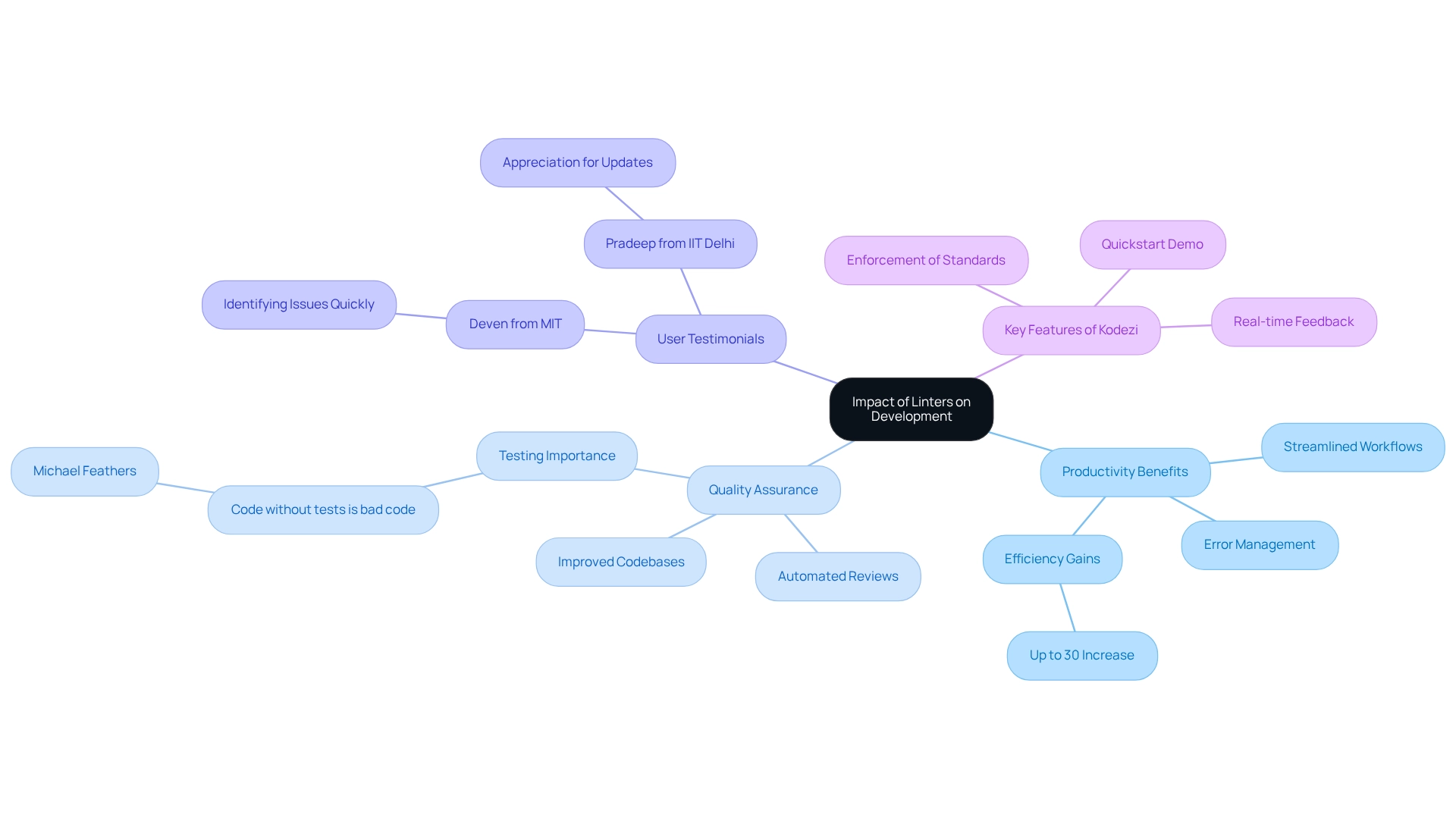
Conclusion
Implementing linters in software development is not merely a choice but a necessity for fostering a culture of quality and efficiency. Developers often face significant coding challenges that can hinder productivity and lead to poor software quality. In this context, tools like Kodezi emerge as essential allies, addressing these challenges effectively. By automating error detection and enforcing coding standards, linters significantly reduce the occurrence of bugs, enhance security, and promote a collaborative environment among developers.
Furthermore, the multifaceted advantages of using Kodezi have been highlighted, showcasing how it streamlines workflows and enhances productivity. The educational benefits of linters cannot be overstated. They serve as invaluable resources for developers, especially those who are newer to the field, by providing immediate feedback and encouraging continuous improvement. This dynamic not only sharpens individual coding skills but also contributes to the overall success of development teams. The integration of Kodezi further amplifies these benefits, offering a user-friendly approach to code debugging and optimization that empowers over a million developers to achieve their goals more efficiently.
In conclusion, as the landscape of software development continues to evolve, adopting linters and tools like Kodezi is essential for teams aiming to enhance their coding practices and improve their output. With the ability to adapt to various programming languages and seamlessly integrate into existing workflows, linters are indispensable in the pursuit of coding excellence. Embracing these tools paves the way for a more productive, secure, and innovative development environment. Are you ready to explore the tools available on the Kodezi platform and elevate your coding practices?
Frequently Asked Questions
What is Kodezi and how does it help developers?
Kodezi is an AI-driven tool that automates the generation of OpenAPI specifications and integrates a linter in programming to help developers maintain high coding standards. It addresses coding challenges that hinder productivity by detecting and correcting mistakes in real-time, allowing developers to focus on building robust applications.
What role does a linter play in programming?
A linter is a tool that enforces coding standards and stylistic conventions by automatically identifying errors like syntax mistakes and formatting inconsistencies. It helps improve code readability and fosters collaboration among team members by ensuring consistent coding practices.
How does Kodezi enhance coding productivity?
Kodezi enhances coding productivity by providing features that tackle performance bottlenecks, bolster security, and ensure compliance with development standards. Its CLI can auto-heal codebases and facilitate regular audits of software quality, significantly boosting programming efficiency.
What are the benefits of using a linter in programming?
Using a linter can lead to a significant reduction in bugs—up to 40% in production errors—by proactively identifying issues. This saves time and resources, allowing developers to concentrate on building solutions while maintaining high programming standards.
How does Kodezi prioritize user privacy?
Kodezi prioritizes privacy by ensuring that users' work and data are safeguarded, making it a secure choice for developers looking to enhance their coding practices.
What resources does Kodezi offer for new users?
Kodezi offers a '5 minute quickstart' guide and invites users to 'See a demo' to experience its capabilities firsthand, facilitating a smooth onboarding process.
Is Kodezi compatible with multiple programming languages?
Yes, Kodezi CLI is compatible with various programming languages, making it an adaptable solution for diverse development environments.
What is the significance of transparency in using AI tools like Kodezi?
Transparency in utilizing AI tools is important as it helps share success stories that can inspire teams to adopt innovative approaches, as highlighted in the case study 'Making Progress Visible.'




